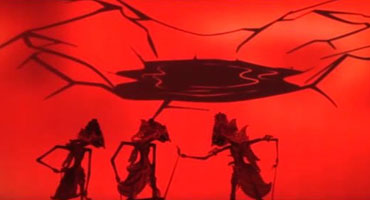
 Saya setuju
Saya setuju
.
Wayang Mitologi (2012)
Dalang: Catur Kuncoro
Cara penulisan kutipan: Catur Kuncoro ([2012] 2016), Wayang Mitologi [Mythological Wayang], translation and notes by Miguel Escobar Varela and Indraswari Kusumaningtyas. Singapore: Contemporary Wayang Archive. Retrieved from http://cwa-web.org/en/WayangMitologi.
Ringkasan (Bahasa Inggris)
Two chickens narrate the origin of Gunung Merapi, a volcano in Java. In their story, two expert swordsmiths, Empu Rama and Empu Permadi, are making a magic weapon that will be able to defeat any existing weapon and keep the rulers of the world in check. Their actions have shifted the balance of the Earth. The Gods decide to close down their workshop and shift part of the Himalayas to Java, in order to re-establish the balance of the Earth. The imported rocks cover the site of the workshop, where the volcano currently stands.
Sumber lakon: Legenda
Iringan: Musik Elektronik, Hip Hop
Artistik: Gedebog, Kelir Video
Pemain: Dalang Tunggal, Sulih Suara
Jenis wayang: Wayang Tradisi, Wayang Garapan
Bahasa: Bahasa Indonesia
Catatan Teknik (Bahasa Inggris)
Catatan: Although this performance was first presented in 2008, the version in the archive corresponds to a 2012 recording made specifically for CWA.
Diproduksi oleh: National University of Singapore and Indonesian Visual Art Archive
Direkam di: Sangar Wayang Hip Hop, Yogyakarta
Pemeran dan kru
Music: Arul Fortis
Voice actors: Teresia Wulandari, Ari Purnomo, Sahono "Oli" Purwanto
Video editing: Miguel Escobar Varela.
Melihat metadata untuk file ini.
Translation and notes by Miguel Escobar Varela (MEV) and Indraswari Kusumaningtyas(IK).
1. Jonggring Saloka is the name of the residence of the gods MEV.
2. Bathara Guru is known as Shiva in India MEV.
3. The dhapur kěris is the kind of keris according to its characteristic shape and ornaments. Pulang gěni means that it throws out fire IK.
4. This song uses a gěndhing méga měndhung [the melody of the rain clouds], in order to convey a solemn atmosphere IK.
5.The Cali Code is a river in Yogyakarta MEV.
6. Possibly a reference to Susilo Bambang Yudoyono, president of Indonesia from 2004 to 2014 MEV.
7. Yamadipati is the god responsible for "cutting off" people's souls at the time of their deaths MEV.
8. This is a sexual joke MEV.
9. In Java, jealousy is said to increase heat MEV.
10. Marcapada is the world of the mortals MEV.
11. Word play. The Javanese word silit [ass] sounds like “sulit” [difficult] in Indonesian MEV.
12. A prapèn is a place that contains fire. For pandé běsi [blacksmiths], the “prapèn” is the furnace to melt the metal IK.
13. The Wisma Atlet has become a symbol for corruption, after millions of Rupiah destined for the construction of the building in 2011 were unaccounted for MEV.
14. Word play. Samar [hidden] sounds like Semar, the divine clown-servant MEV.
15. Here the singer uses a Banyumasan dialect IK.
16. The background story is Abimanyu's death. Utari is left to take care of their baby, Parikesit, on her own IK.
17. Kurusetra is the location of the Baratayuda war MEV.
18. In Hinduism, Karma Phala [fruit of an action] is the consequence of every action IK.
19. The story of Abimanyu's death is detailed in Aneng Kiswantoro's Sumpah Pralaya, also in this archive MEV.
20. In the Kisah lebah putih Kresna becomes a white bee to eavesdrop on God's plans for the Baratayuda war. The Cinta sarau narrates the story of Abimanyu and Utari, which brings death to the former IK.
21. Ndowèr means having a long lip MEV.
22. This is a joke about the producer, who has a beard MEV.
23. The dalang switches fully to Javanese from this point onward MEV.
24. The Punokawan are the clown-servants in wayang: Semar, Petruk, Bagong and Gareng MEV.
25. Another reference to the producer of the show MEV.
26. On the day before this performance, the dalang was interviewed on a TV show. But he arrived late for the interview and only joined in the second segment MEV.
27. Modal nyawa means his only asset is his soul IK.
28. The Tugu is a well known obelisc in Yogyakarta MEV.
29. Ronda is an informal patrol system where neighbors take turns watching over the neighborhood MEV.
30. Koper wadah asi means the case with milk, which can be shortened to koperasi [cooperative] MEV.
31. Lo gue end [you and me are over] is a famous line from a cigarette advertisement MEV.
32. Mabhmu koprol [your grandfather jumps] is an expression used to imply that something is untrue, impossible or does not make sense IK.
33. These friends are danyang, beings who have almost reached perfection, but are still inferior to the gods IK.
34. Éyang Sapu Jagat is the watchman of Mount Merapi IK.
35. Nyai Gadung Melati oversees the plants, in a way comparable to Dewi Sri [the goddess of rice] IK.
36. Brama Dedali is in charge of controlling the lava inside the volcano IK.
The honorifics in the original languages were retained in the subtitles. In Javanese and Indonesian, speakers address their interlocutors with over 40 different honorifics which denote differences in their relative status and level of intimacy.
ID = Indonesian
JW = Javanese
Adik. ID. Younger brother/sister. It is used for addressing younger people, not necessarily one's relatives.
Adinda. ID. Younger sister. More intimate than adik.
Babé. ID/Betawi. Familiar form of father, commonly used in Jakarta.
Bé. ID/Betawi. Short form of Babé, father. Jakartan slang.
Bang. ID. Older brother, short form of abang. If used with non-relatives, it is has the connotation of a slang, and is somewhat equivalent to “man” in English.
Bĕndara. JW. Master.
Bibi. JW/ID. Aunt. A way of addressing/referring to older women.
Bos. ID/JW. An adaptation of the English "boss". Used either to refer to one's superior or to a friend in a joking context, for example, when a person orders others around without realizing he/she is doing so.
Bu. ID/JW. Short form of ibu, mother.
Bung. ID. Similar to bang, but slightly less formal. It might mean "comrade". The political leaders of the independence war are often referred to with this term, for example Sukarno is often referred to as
Bung Karno.
Dara. JW. Short form of bĕndara, master.
Dèn. JW. Sir, master, used to address royalty. Short form of radèn.
Dhé. JW. Short form of pakdhé, uncle.
Dhik. JW. Short form of adhik. Younger brother/sister. It is used for addressing younger people, not necessarily one's relatives.
Éyang. JW. Grandfather.
Dimas. JW. Younger brother.
Gusti. JW. Lord. Used to address superiors and Gods.
Ibu. JW/ID. Mother. Used generically to address women who are older than the speaker.
Kakang. JW. Older brother.
Kakang mbok. JW. Older sister.
Kanda. ID. Older brother. Formal.
Kang. JW. Older brother. Informal.
Kangmas. JW. Older brother.
Kaki. JW. Uncle
Kang. JW. Older brother, used generically for men older than the speaker. It is a shortened version of kangmas).
Kakak. JW/ID. Older brother/sister, used generically for people who are older than the speaker.
Lé. JW. Son, short version of tholé.
Lik. JW. Often used between friends as a slang term of address. Uncle, "little father." Short form of {paklik}.
Ma. JW. Same as pak, short form of rama.
Mbak. JW/ID. Older sister. Used generically for women who are slightly older than the speaker.
Mamang. ID. Uncle.
Mang. ID. Uncle, short form of mamang.
Mas. ID. Older brother, used generically for men who are older than the speaker. Although it is also a shortened version of the Javanese kangmas people prefer to use mas in Indonesian and kang in Javanese.
Mas bro. ID. Slang used among male friends. In a way, it is a reduplication.
Mbah. JW/ID Grandfather, grandmother. It is used generically to address people who are much older than the speaker. Short form of simbah.
Mbok. JW. Mother, short form of simbok. Used generically for women who are older than the speaker.
Mbokdhé. JW. Aunt. Literally, "big mother".
Mbul. JW. Informal term of address between close male friends.
Ndara. JW. Master.
Nduk. JW. Daughter, short form of gĕndhuk.
Nggèr. JW. Son, short form of anggèr Used generically for people who are younger than the speaker, with whom the speaker is on intimate terms.
Nimas. JW. Younger sister.
Nok. JW. West Javanese term for daughter, short form of dhénok.
Nona. ID. Miss, unmarried woman.
Paduka. ID. Your Excellency.
Pak. JW/ID. Father, used generically for men who are older than the speaker.
Pakdhé. JW. Uncle. Used to refer to a man who is older than one's father.
Paman. ID. Uncle. Used to refer to a man who is older than one's father.
Pangéran. JW/ID. Prince.
Prabu. JW. King.
Radén. JW. Master, used for royalty.
Rama. JW. Father. It can also be used to designate catholic priests when one is speaking in Indonesian.
Simbah. JW/ID Grandfather, grandmother. It is used generically to address people who are much older than the speaker.
Sinuwun. JW. Very formal way to address a man, reserved for sultans, kings and Gods.
Siwa. JW. Term for addressing older people.
Siwak. JW. Same as Siwa. Term for addressing older people.
Tholé. JW. Son
Tuan. ID. In colonial contexts, this is the way foreigners are addressed but it can also mean sir.
Wa Nĕrpati. JW. Uncle king, equivalent to the Indonesian paman raja.
Wa. JW. For addressing older people, short form of siwa.
Yayi. JW. Younger brother/sister.
Yunda. JW. Older sister.
See the Translation conventions.
Share:
dalam terjemahan atau informasi video.
